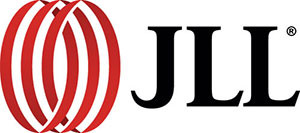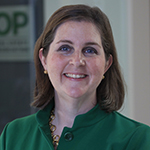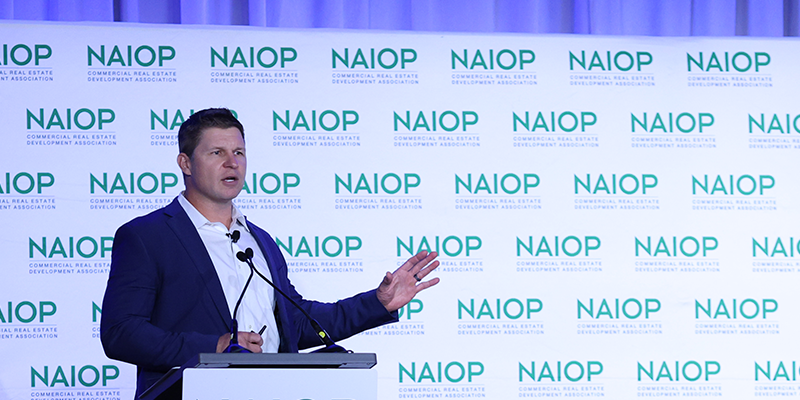By Kathryn Hamilton
It’s well understood that emerging generations bring distinct expectations around company culture, technology adoption and the vital role of mentorship in career development. At this week’s I.CON East conference in New Jersey, a panel of industry professionals from these rising generations shared their insights and perspectives on the future of the evolving commercial real estate sector.
Moderated by Mark G. Levy, president and CEO, Altman Logistics Properties, panelists were Gina Allegrini, associate, Marcus & Millichap; Frances Jackson, vice president asset management, Robinson Weeks Partners; Connor Milanaik, senior director, acquisitions, Bridge Industrial; and Sal Visali, director, portfolio management, GID Industrial.
Here are a few takeaways from their conversation:
Artificial intelligence is a powerful tool, but it’s not a substitute for industry experience and judgment. New technologies are constantly emerging, offering significant efficiencies – particularly for time-consuming, routine tasks. Common high-impact applications include abstracting leases, reviewing confidentiality agreements for key provisions, conducting property-level SWOT analyses, generating status reports, and drafting marketing content. Some solutions can even integrate local zoning data to accelerate underwriting and decision-making processes. The best way to begin using AI is with topics you already know well; this allows you to gauge its accuracy and understand where it excels. It’s not about relying on AI to replace expertise but about using it as a valuable tool to boost efficiency and productivity.
While leveraging AI to analyze leases and contracts may appear low-risk, organizations should proceed with caution. Even seemingly routine documents can reveal sensitive details about a company’s operations or strategic priorities. To mitigate potential exposure, larger and more sophisticated firms are increasingly investing in proprietary, in-house AI solutions to maintain greater control over their data and safeguard competitive intelligence.
To effectively bridge the generational gap around technology adoption, empower younger employees to explore emerging tools and introduce their practical applications to senior leadership. Every innovation was new once – just as mobile phones once faced resistance, today’s AI tools may initially meet skepticism. However, younger professionals, having grown up immersed in technology, are well-positioned to lead the way in integrating cutting-edge technology into everyday business functions. Consider forming an internal task force made up of early-career employees to identify creative, high-impact use cases. Don’t limit innovation to internal efforts – explore cross-firm collaboration within noncompetitive peer groups to exchange ideas, share insights, and potentially co-develop proprietary tools that benefit all participants.
Entry-level roles in commercial real estate are being redefined as technology evolves. Altus Group, parent company of the widely used ARGUS valuation and cash flow forecasting software, is transitioning its legacy platform to a more interactive, web-based interface. This next-generation tool can automate underwriting by incorporating market rent and cap rate data, enabling rapid analysis of entire submarkets based on standardized assumptions. While this shift won’t replace analysts, it will accelerate the transition from data entry to higher-level analytical work. The result: a more efficient underwriting process and a workforce that upskills faster and adds greater strategic value.
In commercial real estate – a relationship-driven industry – face-to-face interactions and on-site presence remain essential for long-term growth and success. However, modern technology enables flexibility, allowing professionals to step away from the office while staying connected. This always-on connectivity can blur boundaries between work and personal life, presenting new challenges in maintaining balance. From a talent perspective, non-transactional roles that support CRE operations – such as accounting or marketing – often expect greater remote work flexibility. As a result, firms should consider hybrid models that align with role-specific needs while fostering a culture that motivates in-office engagement when it matters most.
In today’s digital landscape, social media is a powerful tool for amplifying brand visibility and staying top of mind. It enables companies to communicate authenticity, showcase expertise, and build trust with both external audiences and potential recruits. Increasingly, firms are leveraging social platforms not only to highlight company culture, events and values – but also to underscore their commitment to social responsibility and career development, all of which resonate strongly with younger generations. For communities near active developments, social media can help demonstrate that a project is more than just a building – it’s a catalyst for local impact. It also serves as a vital channel for engaging brokers, stakeholders, customers, and the broader public, while reinforcing thought leadership through accessible and informative content.
Mentorship is an invaluable component of career growth. Having a senior leader as a sounding board, advocate and internal champion can make all the difference in navigating challenges and building confidence. For those looking to advance, success requires a combination of the right mindset, a strong foundation of knowledge, and a network of supportive individuals. Meaningful mentorship doesn’t require shared backgrounds or identical career paths. In fact, connecting with those who bring different experiences and skill sets can lead to broader perspectives and deeper growth.
A strong company culture recognizes employees as whole people. Productivity and performance matter, but so do family, wellness and individual achievements. Companies that embrace the full spectrum of an employee’s humanity foster environments where people thrive – because culture isn’t just what happens at work; it’s how people feel when they show up.
NAIOP can support your career from the beginning. NAIOP offers essential opportunities for integration and development – whether through its National Forums, which provide intimate advisory groups, or by expanding your leadership within local chapters. Organizations like NAIOP create valuable platforms to learn, connect and grow, both within your local market and across North America.

This post is brought to you by JLL, the social media and conference blog sponsor of NAIOP’s I.CON East 2025. Learn more about JLL at www.us.jll.com or www.jll.ca.








